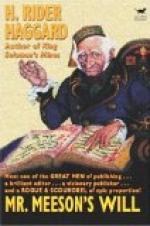Just at the dawn, Augusta dreamed that somebody with cold breath was breathing on her face, and woke up with a start and listened. Jeannie’s bed was on the other side of the room, and she could generally hear her movements plainly enough, for the sick child was a restless sleeper. But now she could hear nothing, not even the faint vibration of her sister’s breath. The silence was absolute and appalling; it struck tangibly upon her sense, as the darkness struck upon her eye-balls and filled her with a numb, unreasoning terror. She slipped out of bed and struck a match. In another few seconds she was standing by Jeannie’s white little bed, waiting for the wick of the candle to burn up. Presently the light grew. Jeannie was lying on her side, her white face resting on her white arm. Her eyes were wide open; but when Augusta held the candle near her she did not shut them or flinch. Her hand, too—oh, Heavens! the fingers were nearly cold.
Then Augusta understood, and lifting up her arms in agony, she shrieked till the whole house rang.
CHAPTER IV.
AUGUSTA’S DECISION.
On the second day following the death of poor little Jeannie Smithers, Mr. Eustace Meeson was strolling about Birmingham with his hands in his pockets, and an air of indecision on his decidedly agreeable and gentlemanlike countenance. Eustace Meeson was not particularly cast down by the extraordinary reverse of fortune which he had recently experienced. He was a young gentleman of a cheerful nature; and, besides, it did not so very much matter to him. He was in a blessed condition of celibacy, and had no wife and children dependant upon him, and he knew that, somehow or other, it would go hard if, with the help of the one hundred a year that he had of his own, he did not manage, with his education, to get a living by hook or by crook. So it was not the loss of the society of his respected uncle, or the prospective enjoyment of two millions of money, which was troubling him. Indeed, after he had once cleared his goods and chattels out of Pompadour Hall and settled them in a room in an Hotel, he had not given the matter much thought. But he had given a good many thoughts to Augusta Smithers’ grey eyes and, by way of getting an insight into her character, he had at once invested in a copy of “Jemima’s Vow,” thereby, somewhat against his will, swelling the gains of Meeson’s to the extent of several shillings. Now, “Jemima’s Vow,” though simple and homely, was a most striking and powerful book, which fully deserved the reputation that it had gained, and it affected Eustace—who was in so much different from most young men of his age that he really did know the difference between good work and bad—more strongly than he would have liked to own. Indeed, at the termination of the story, what between the beauty of Augusta’s pages, the memory of Augusta’s eyes, and the knowledge of Augusta’s wrongs, Mr. Eustace Meeson




